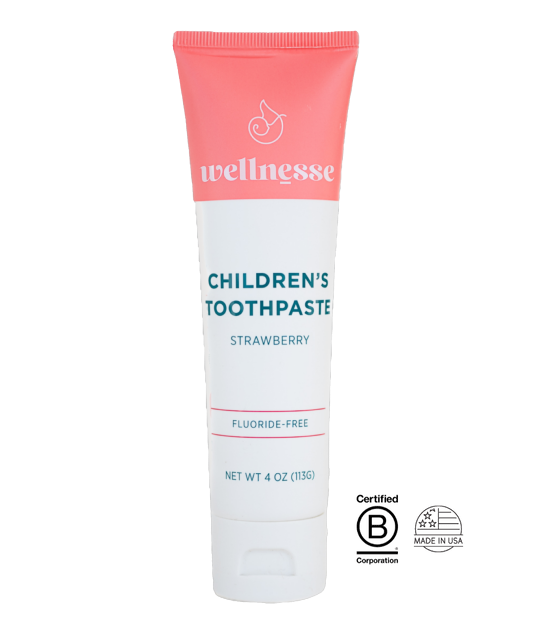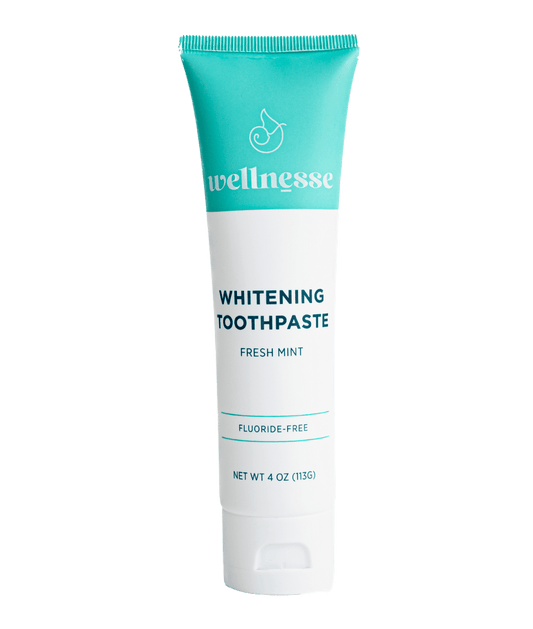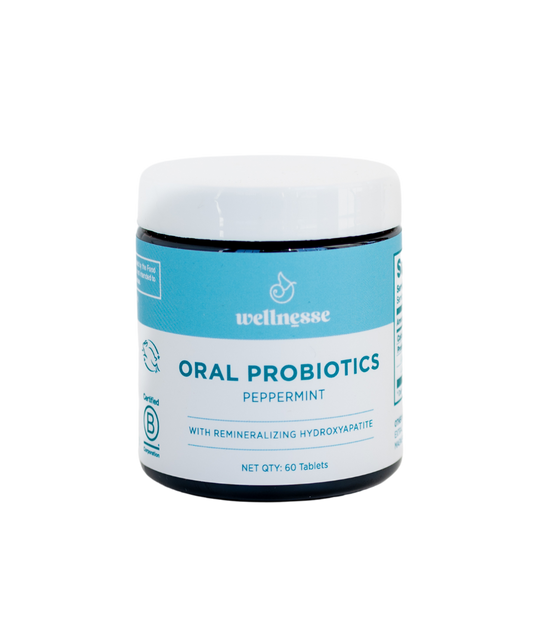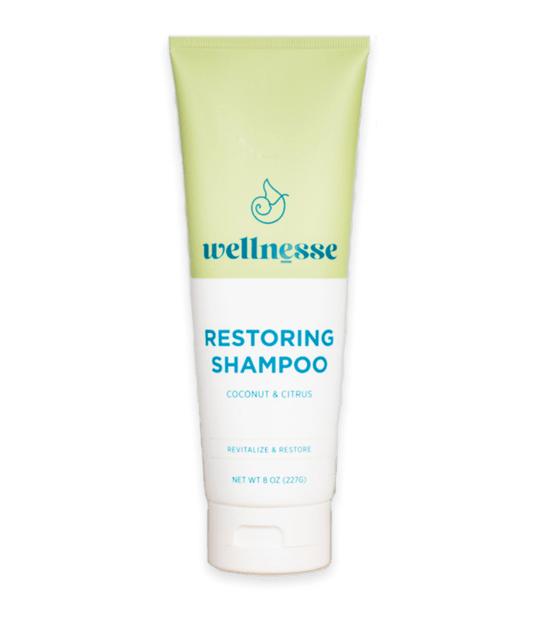
A Guide to the Minerals in Your Teeth
Have you ever wondered what makes your teeth so strong? Most of us take oral health for granted, trusting that good oral care will keep decay and toothache at bay. However, many people fail to realize the importance of certain minerals in our teeth that help prevent cavities and maintain a smooth, strong enamel surface.
So, how can you hold on to the minerals fundamental to dental health? To help you learn the facts about minerals in teeth, we have put together a quick guide below.
Give your smile some love with our bestselling remineralizing, whitening toothpaste!
What Minerals Are in Teeth and What Do They Do?
Calcium is the foundational mineral of healthy teeth and bones, helping harden enamel and providing structural support to ensure your body stays strong. People with calcium deficiency often find that their tooth sockets widen and wear away, leading to loosened teeth. Late-stage deficiency symptoms include tooth decay and loss – an outcome we prefer to avoid!
Many people turn to milk as the best way to maintain a high calcium intake. While dairy products are highly marketed for this, you can also fulfill your nutritional needs through calcium-rich vegetables, such as broccoli and leafy greens, and natural supplements.
Magnesium works to harden tooth enamel and prevent loss of bone density. Rich sources of magnesium include nuts, dark green vegetables, rye, brown rice, and other whole grains. It is worth noting that overconsumption of magnesium can cause unpleasant digestive symptoms such as diarrhea and abdominal pain, so it's wise to spread your consumption of these foods evenly throughout the day.
Phosphorus is present in oily fish, beef, cheese, lentils, soybeans, and other plant-based foods. It works alongside calcium to support bones and teeth and is particularly important for maintaining a strong jaw.
Potassium improves the mineral density of bones and works alongside magnesium to prevent blood acidification. If your blood becomes too acidic, you may lose calcium from your teeth and bones. Rich sources of potassium include tomatoes, bananas, avocados, and potatoes.
Can You Replenish the Minerals in Your Teeth?
With a few lifestyle changes and the proper dental care products, it is possible to replenish the minerals in your teeth. According to a recent scientific literature review, it has become clear that teeth contain natural repair mechanisms designed to reverse tooth demineralization. Moreover, many remineralization techniques and treatments have produced positive results in recent years.
Before starting your remineralization journey, you must understand which aspects of your lifestyle may contribute to the loss of minerals. Common culprits include:
- Sugar (and other artificial sweeteners): It probably goes without saying that high sugar intake can lead to poor oral health in general. However, it's important to know that sugar is highly acidic and one of the most common causes of demineralization. In addition, artificial sweeteners are packed with chemicals. As tempting as it can be to reach for a can of soda, try to stick to water when you're thirsty!
- Fruits and fruit juice: While a cool glass of orange juice may look innocent, fruit acids can easily strip away calcium and tooth enamel. Try to limit your consumption of acidic/citrus fruits, such as oranges and grapefruits, and avoid juices altogether. Low-acid fruits include mangoes, watermelons, pears, and bananas.
- Dairy: While clean, whole dairy can be a vital source of calcium, the lactose present in traditional milk products can make your mouth more acidic and contribute to enamel loss! The solution? Drink milk in moderation and consume calcium from a variety of sources.
- Dry mouth: Do your lips and teeth often feel parched? You may not be producing enough saliva. Saliva is fundamental for preventing cavities and supporting remineralization, so you must address your dry mouth by drinking plenty of water and, if necessary, going in for a dental checkup.
How to Restore Lost Minerals
So, now you know how to prevent rapid demineralization of the teeth, how can you restore lost minerals and prevent age-related demineralization? Here are a few top tips:
- Consume plenty of calcium: Beyond dairy products, there is plenty of calcium in other foods, including almonds, leafy vegetables, sardines, salmon, and more. You may consider calcium supplements if you have dietary restrictions.
- Chew sugar-free gum: Chewing gum can help remove plaque and sugar from teeth while boosting saliva production. As such, it could help reduce your mouth's acid levels and prevent mineral loss. The best time to chew gum is just after a meal.
- Practice strict oral hygiene: This may be obvious, but brushing and flossing your teeth at least twice daily is vital for preventing cavities and removing bacteria that can contribute to demineralization. Our Toothpaste formulas are packed with remineralizing hydroxyapatite that fills in the nooks and crannies to help them rebuild and remineralize from the inside out!
- Soak in vitamin D: Vitamin D is vital for calcium absorption, so it is important that you maintain high levels via safe sun exposure, food (like fish), and supplements, if necessary (but always check with your doctor first!)
- Prioritize probiotics: Probiotics contain friendly bacteria that can balance out pH levels in your mouth and contribute to tooth remineralization. Look out for probiotic products containing acidophilus, salivarius, or reuteri. Our brand-new peppermint Oral Probiotics contain all three of these strains (and more!) and make getting your daily probiotic fix easier and tastier than ever. Our probiotics also contain the same hydroxyapatite as our toothpaste, making each tiny tablet a balancing, remineralizing powerhouse!
Can Hydroxyapatite Toothpaste Support Your Oral Health?
Yes!
If you are searching for a natural and reliable way to strengthen, whiten, and remineralize teeth, look no further than our Wellnesse toothpaste. Our clean, cruelty-free remineralizing formula uses powerful, natural hydroxyapatite and green tea leaf extract in place of standard, neurotoxic fluoride, helping to fight tooth decay without harsh chemicals.
We have an entire blog post on hydroxyapatite remineralization, which includes hydroxyapatite benefits and scientific research, as well as information on our specific variety, including our sourcing methods and particle size!
Give it a try today!
Resources:
Arifa, M., Ephraim, R., Rajamani, T. (2019, Mar-Apr). Recent Advances in Dental Hard Tissue Remineralization: A Review of Literature. NIH. https://www.ncbi.nlm.nih.gov/pmc/articles/PMC6749882/
Bone Health and Osteoporosis. NIH. https://www.bones.nih.gov/health-info/bone/bone-health/nutrition/calcium-and-vitamin-d-important-every-age
Wells, K. (2020, June 12). Benefits of Hydroxyapatite For Teeth and More. Wellness Mama. https://wellnessmama.com/health/hydroxyapatite/








1 comment
I have been very pleased with the Wellness toothpaste and bamboo toothbrush. My dentist is impressed with my teeth too. Thank you!